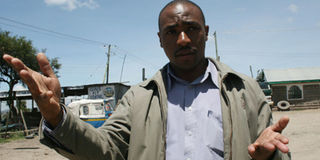Meet Kenya's only blind detective

Constable Alphonce Mutinda during the interview with Saturday Nation in Kitengela on March 18, 2010. Photo/PETERSON GITHAIGA
Perhaps more than any other profession in the country, the police force demands that everyone who works there be close to 100 per cent physically fit.
One policeman, however, defies that attribute: Constable Alphonce Masila Mutinda is blind, and works as a Criminal Investigation Department officer. To cap it all, his prowess and dedication to his duty, despite being the only blind CID interrogator in the country, is the envy of many, including his peers.
He has a sad tale about the circumstances that led to his disability, and how he overcame his misfortune. It all goes back to May, 2007. That month, Mutinda, 33, lost two of the most important gifts in life: his sight and his wife. After 10 years in the police force, he suffered two bouts of meningitis, first in 2006 and again in May 2007.
The disease left him blind, and, as he was recovering, his wife of five years left him, taking away their only child. Three years down the line, however, Mutinda has learnt to live with his disability. The former fingerprints expert chose to stay with the police force as a CID officer, stationed at Kitengela police post.
There are not many blind policemen in the country. Police spokesman Eric Kiraithe says: “We do not recruit blind officers but along the way, one or two may develop medical complications. In such circumstances, they are not removed but we let them continue to serve.” As we enter the office, he stands up to welcome us with an outstretched hand.
All this while there is no indication that he is blind save for the Braille equipment on his table and the white cane behind his chair. “It is only when he takes out a punched brown piece of paper from the file to begin reading that one realises he is blind. “People come here and leave without knowing that I am blind,” says Mutinda, whose work today mainly entails interrogation. “It’s by God’s will that I cannot move around with a lot of ease as before,” he remarks.
Mutinda is from Mulingana, Kangundo. He has worked at CID headquarters in Ruaraka, and in Nandi Hills. After losing his sight, Mutinda enrolled at Machakos Technical School for the Blind to study Braille in September 2007. The school also acted as a rehabilitation centre for him. “I learned to use Braille independently and even started walking with a white cane,” he said.
With only his sight gone but the desire to serve the country still alive and burning, he returned to his old job, as interrogator. He is not done yet with learning Braille and is currently saving for his fees. At Kitengela, along with six colleagues, Mutinda is among the leading crime busters.
While interrogating the suspects, he sometimes takes down notes in Braille that he later uses to brief his boss, he said. Though bereft of sight, Mutinda’s prowess in his duty is the envy of many, including his colleagues. His condition does not bother him anymore “because God has accorded me life and another dimension in my duty,” he says.
He has never contemplated quitting the police force, nor has anyone asked him to retire on compassionate grounds, he said. He has learnt to walk up the stairs with the white cane to the office he shares with his colleagues. At Kitengela, he lives across the road opposite the police post, and every morning and evening, he crosses the usually busy Nairobi-Namanga highway.
Occasionally, he is helped across the road by Good Samaritans because, he says, drivers along the road do not respect the white cane. Mutinda has since remarried after the trying period and lives with his wife in Kitengela.




